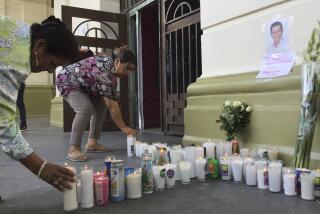A mayor in Mexico is shot dead a day after taking office
- Share via
Reporting from Mexico City — Gisela Mota was sworn into office as mayor of the small city of Temixco in the state of Morelos on New Year’s Day, after promising to help free the small town from the grip of organized crime.
Less than 24 hours later, the 33-year-old politician was dead — the latest of hundreds of public servants to be the victims of drug-related violence in Mexico in the last decade.
On Sunday, the Mexican news website SinEmbargo reported that one of three suspects detained after the shooting told authorities that the perpetrators were paid 500,000 Mexican pesos — about $29,000 — to kill Mota. The newspaper El Universal said the killing was the work of Los Rojos (“the Reds”) drug gang, which has been engaged in a bloody battle for territory against rival groups in the neighboring state of Guerrero.
“I hope and pray to God that Gisela’s death helps to make us all more conscious” of the crime problem, said Roman Catholic Bishop Ramon Castro, speaking Sunday at a memorial Mass for Mota in Temixco, according to the newspaper Reforma. “I’m no expert, but the only thing I see is that various communities here are in the hands of organized crime — I’ve been saying that for a while, and begging, and no one has been able to do anything.”
Mota, who was part of the left-leaning Democratic Revolutionary Party, had vowed to “combat organized crime frontally and directly,” according to Agustín Basave, the party’s national president, who sent his condolences to her family via Twitter. Prior to becoming mayor, she had been a congresswoman representing Morelos state since 2013.
She was shot dead in her home at around 7 a.m. Saturday, in the small nearby town of Pueblo Viejo, about a two-hour drive from Mexico City, by a group of armed assailants, according to local authorities.
Join the conversation on Facebook >>
After her killing, local media reported that Mota’s bodyguards and police gave chase and a shootout ensued, during which two people were killed and three arrested. Bulletproof vests, balaclavas, a 9mm pistol, an Uzi rifle and various types of ammunition were recovered from the car they were traveling in, according to a statement from the local prosecutor’s office.
Javier Pérez Durón, Morelos’ state prosecutor, confirmed at a news conference that three suspects were in custody and that Mota’s killers would be subjected to “the full weight of the law.”
The governor of the state of Morelos, Graco Ramirez, announced three days of official mourning following Mota’s death.
Temixco lies on the outskirts of the capital of Morelos, Cuernavaca, which has seen high levels of drug-related violence, kidnappings and extortion in recent years.
Mota’s death brings the number of local elected officials killed in Mexico in the last decade to nearly 100, according to the Association of Local Mexican Authorities.
In a statement distributed via Twitter, the group said that more than a thousand public municipal servants have been killed since 2006, mainly by organized crime.
“Urgent action is needed from the government to stop this wave of violence,” the statement said.
In 2006, then-President Felipe Calderon launched a crackdown on organized crime, but since then violent homicides have spiked. Although the current president, Enrique Peña Nieto, has continued Calderon’s crackdown, more than 100,000 people are now dead or missing as a result of violence generated by conflict between rival gangs or the authorities.
Such killings are rarely solved. Even when they are, the corruption within Mexico’s judicial system and its reputation for abuse and torture of suspects often leaves a cloud of doubt in the public mind.
Bonello is a special correspondent.
ALSO
President Obama considering visit to Cuba to shore up relations – and his foreign policy legacy
Argentina’s ‘little trees’ getting chopped down by new president
Mexican marijuana farmers see profits tumble as U.S. loosens laws
More to Read
Sign up for Essential California
The most important California stories and recommendations in your inbox every morning.
You may occasionally receive promotional content from the Los Angeles Times.










